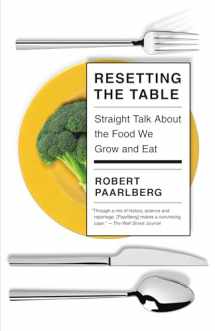
Resetting the Table: Straight Talk About the Food We Grow and Eat
Book details
Summary
Description
A bold, science-based corrective to the groundswell of misinformation about food and how it's produced, examining in detail local and organic food, food companies, nutrition labeling, ethical treatment of animals, environmental impact, and every other aspect from farm to table.
Consumers want to know more about their food--including the farm from which it came, the chemicals used to grow it, its nutritional value, how the animals were treated, and the costs to the environment. They are being told that buying organic foods, unprocessed and sourced from small local farms, is the most healthful and sustainable option. But what if we're wrong? In Resetting the Table, Robert Paarlberg reviews the evidence and finds abundant reason to disagree. He delineates the ways in which global food markets have in fact improved our diet, and how "industrial" farming has recently turned green, thanks to GPS-guided precision methods that cut energy use and chemical pollution. He makes clear that America's serious obesity crisis does not come from farms, or from food deserts, but instead from "food swamps" created by food companies, retailers, and restaurant chains. And he explains how, though animal welfare is lagging behind, progress can be made through continued advocacy, more progressive regulations, and perhaps plant-based imitation meat. He finds solutions that can make sense for farmers and consumers alike and provides a road map through the rapidly changing worlds of food and farming, laying out a practical path to bring the two together.


We would LOVE it if you could help us and other readers by reviewing the book
Book review



